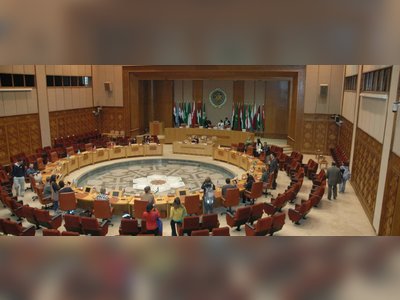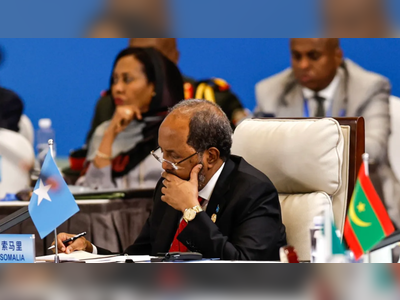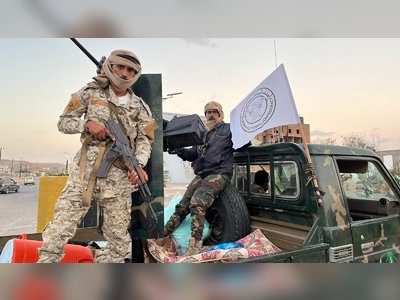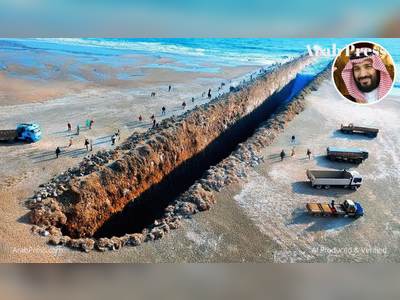
First Aid Trucks Enter Gaza After Extended Blockade
Following nearly three months of blockade, limited aid has begun flowing into Gaza as humanitarian concerns escalate.
TEL AVIV: The first few aid trucks have entered Gaza after nearly three months of a complete blockade by Israel on food, medicine, and other critical supplies, as reported by the Israeli defense body responsible for coordinating aid, COGAT.
Five trucks carrying essential items, including baby food, crossed into the territory housing over 2 million Palestinians via the Kerem Shalom crossing.
The United Nations welcomed this development but emphasized that far more aid is required to address the severe humanitarian crisis in the region.
Humanitarian experts have previously warned that famine is a dire risk in Gaza amid ongoing conflict.
Prior to the current situation, during a ceasefire that Israel ended in March, as many as 600 aid trucks were entering Gaza each day.
Israeli Prime Minister Benjamin Netanyahu indicated that the decision to allow limited aid deliveries was influenced by pressure from international allies who expressed concerns regarding the humanitarian conditions in Gaza.
He noted that allied leaders emphasized the importance of avoiding negative public perceptions, particularly images depicting hunger within the Palestinian territory.
UN humanitarian chief Tom Fletcher referred to the initial trucks as a mere "drop in the ocean of what is urgently needed," stressing the necessity for increased delivery of aid.
He mentioned that four additional UN trucks are expected to enter Gaza shortly, though logistical challenges remain, with concerns that aid could be looted or taken due to worsening scarcity of resources.
In conjunction with the resumption of aid, Israel has intensified its military operations within Gaza, including recent air and ground assaults.
The Israeli military issued evacuation orders for Khan Younis, Gaza's second-largest city, where extensive operations had previously occurred, resulting in considerable destruction.
Israel maintains that its military campaign aims to compel Hamas to release hostages taken during an attack on October 7, 2023, which marked the commencement of heightened conflict.
Hamas has stated it will only consider releasing these hostages in exchange for a protracted ceasefire and an Israeli withdrawal from the territory.
In this context, Netanyahu outlined Israel's plans to exert greater control over Gaza and to develop a new aid distribution system designed to bypass Hamas.
He suggested that Israel would actively encourage the emigration of a significant portion of Gaza’s population, a proposal that has been met with rejection from Palestinian authorities.
The US administration has expressed support for Israel's military actions while attributing blame to Hamas for civilian casualties in Gaza; however, there has been a noted increase in concern regarding the humanitarian situation.
President Donald Trump and Secretary of State Marco Rubio have both publicly voiced worries about the unfolding crisis.
Netanyahu made a statement indicating that the current situation is nearing a "red line" of acceptability, though the specifics of this assessment were not clarified.
His statement was perceived as moderating sentiments within his right-wing political base, which is largely opposed to the resumption of aid to Gaza.
Israeli officials have indicated that the aid being permitted is minimal and serves only as an interim measure while a new distribution mechanism is established.
The planned system involves a US-backed organization implementing aid distribution at secured points, ostensibly to prevent alleged misuse of assistance by Hamas.
Aid organizations have criticized this approach, asserting that it compromises humanitarian principles and fails to reach a broad enough beneficiary base.
This initiative may necessitate further displacements of Palestinians within Gaza, particularly southward, as previous ceasefire conditions granted some refugees temporary returns to their homes in the northern areas.
Israeli operatives, disguised as displaced individuals, launched a ground raid in Khan Younis that resulted in the death of Ahmed Sarhan, a leader associated with the Popular Resistance Committees.
This operation, supported by extensive aerial bombardments, reportedly resulted in additional casualties, including civilians in nearby shelters.
The conflict, which began with the Hamas-led attack on southern Israel that resulted in approximately 1,200 fatalities, primarily among civilians, has escalated significantly.
Hostages taken during this initial assault remain a contentious point, with the ongoing Israeli military response resulting in substantial Palestinian casualties, including over 53,000 deaths, as reported by local health officials, who do not distinguish between combatants and non-combatants in their casualty counts.
Five trucks carrying essential items, including baby food, crossed into the territory housing over 2 million Palestinians via the Kerem Shalom crossing.
The United Nations welcomed this development but emphasized that far more aid is required to address the severe humanitarian crisis in the region.
Humanitarian experts have previously warned that famine is a dire risk in Gaza amid ongoing conflict.
Prior to the current situation, during a ceasefire that Israel ended in March, as many as 600 aid trucks were entering Gaza each day.
Israeli Prime Minister Benjamin Netanyahu indicated that the decision to allow limited aid deliveries was influenced by pressure from international allies who expressed concerns regarding the humanitarian conditions in Gaza.
He noted that allied leaders emphasized the importance of avoiding negative public perceptions, particularly images depicting hunger within the Palestinian territory.
UN humanitarian chief Tom Fletcher referred to the initial trucks as a mere "drop in the ocean of what is urgently needed," stressing the necessity for increased delivery of aid.
He mentioned that four additional UN trucks are expected to enter Gaza shortly, though logistical challenges remain, with concerns that aid could be looted or taken due to worsening scarcity of resources.
In conjunction with the resumption of aid, Israel has intensified its military operations within Gaza, including recent air and ground assaults.
The Israeli military issued evacuation orders for Khan Younis, Gaza's second-largest city, where extensive operations had previously occurred, resulting in considerable destruction.
Israel maintains that its military campaign aims to compel Hamas to release hostages taken during an attack on October 7, 2023, which marked the commencement of heightened conflict.
Hamas has stated it will only consider releasing these hostages in exchange for a protracted ceasefire and an Israeli withdrawal from the territory.
In this context, Netanyahu outlined Israel's plans to exert greater control over Gaza and to develop a new aid distribution system designed to bypass Hamas.
He suggested that Israel would actively encourage the emigration of a significant portion of Gaza’s population, a proposal that has been met with rejection from Palestinian authorities.
The US administration has expressed support for Israel's military actions while attributing blame to Hamas for civilian casualties in Gaza; however, there has been a noted increase in concern regarding the humanitarian situation.
President Donald Trump and Secretary of State Marco Rubio have both publicly voiced worries about the unfolding crisis.
Netanyahu made a statement indicating that the current situation is nearing a "red line" of acceptability, though the specifics of this assessment were not clarified.
His statement was perceived as moderating sentiments within his right-wing political base, which is largely opposed to the resumption of aid to Gaza.
Israeli officials have indicated that the aid being permitted is minimal and serves only as an interim measure while a new distribution mechanism is established.
The planned system involves a US-backed organization implementing aid distribution at secured points, ostensibly to prevent alleged misuse of assistance by Hamas.
Aid organizations have criticized this approach, asserting that it compromises humanitarian principles and fails to reach a broad enough beneficiary base.
This initiative may necessitate further displacements of Palestinians within Gaza, particularly southward, as previous ceasefire conditions granted some refugees temporary returns to their homes in the northern areas.
Israeli operatives, disguised as displaced individuals, launched a ground raid in Khan Younis that resulted in the death of Ahmed Sarhan, a leader associated with the Popular Resistance Committees.
This operation, supported by extensive aerial bombardments, reportedly resulted in additional casualties, including civilians in nearby shelters.
The conflict, which began with the Hamas-led attack on southern Israel that resulted in approximately 1,200 fatalities, primarily among civilians, has escalated significantly.
Hostages taken during this initial assault remain a contentious point, with the ongoing Israeli military response resulting in substantial Palestinian casualties, including over 53,000 deaths, as reported by local health officials, who do not distinguish between combatants and non-combatants in their casualty counts.











